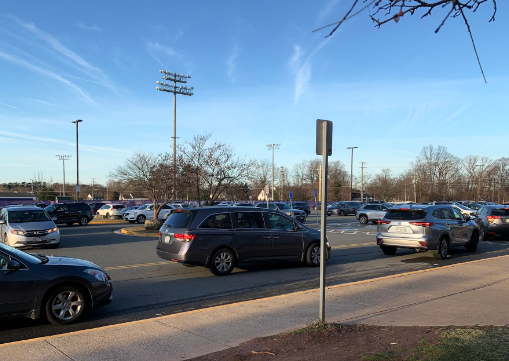New policy tackles tardiness troubles

On Feb. 14, at 8 a.m, a backed up line of cars forms, students waiting to be dropped off even as the opening bell approaches.
April 8, 2023
During the Jan. 24 broadcast of The Knightly News, students, or at least those who arrived on time to watch the morning announcements, watched as former principal Dr. Scott Poole delivered a message: tardiness, especially in the mornings, was so severe of an issue that a new tardy policy needed to be brought into effect.
“I think that the tardy problem is definitely real, and I see it a lot with freshmen, especially with some of my friends,” freshman Sreesai Jakkampudi said. “I know it’s a school-wide issue, but I feel like [freshmen] specifically don’t have as much experience compared to older students when it comes to managing time and feeling that sense of urgency that they should feel when thinking about school.”
In addition to the ability to manage time, lack of sleep is another factor that influences whether or not a student is able to walk through the doors before the bell rings. According to a poll by Consumer Affairs, 14% of high school students surveyed have arrived late or missed school due to oversleeping.
“A lot of students just don’t care about sleep very much,” freshman Jason Kim said. “In random conversations I’ll hear people talking about going to bed at times like 2 a.m. whether it’s because they have to do homework or just because, and sometimes they’ll joke about it or act proud of it.”
According to a study by the CDC Division of Population Health, the amount of sleep a student gets every night has been found to correlate with the amount of times a student is marked for tardiness. Students who receive more time to sleep are more likely to be on time, but also have higher levels of attendance and academic performance.
“I have been tardy quite a few times, and I realize that it always happens due to me staying up late to finish my work, then being super tired in the morning due to the lack of sleep,” freshman Dhruv Jana said. “But now, more than ever, I have been thinking more about my schedule and how I work now that there are more consequences for being tardy.”
When students are late in leaving the house, they lose their chance of taking the bus, and walking to school on time becomes impossible for students who live miles away. As a result, many late students turn to being driven to school, creating a crowded rush of cars in the parking lot. According to the United States Department of Energy, in 2019, over half of the 50 million surveyed students were transported to school by car.
“Whenever my mornings get out of control, I miss the bus and am forced to ask to be driven,” Kim said. “The drop off line is always really long, like everyone is fighting each other to get in on time. The most telling thing about the massive line of cars waiting for dropoff just moments from the bell, is that a lot of people are hanging on by a thread in terms of getting to school on time; it really visualizes the scale of it.”
With the new policy, students receive consequences based on how many times they accumulate more than five unexcused tardies. First offenders will be given a warning, but as a student obtains more unexcused tardies, consequences like lunch detention, notifications to clubs and coaches and parking pass suspensions will be administered. The full details regarding the tardiness policy have been communicated to parents.
“I see the stricter tardy policy as an overall good thing,” Jakkampudi said. “Of course there are reasons outside of people’s control that cause tardiness, but the new rules force people to think more seriously on the importance of their responsibilities. When privileges like clubs are taken away, the consequences feel more like they have an immediate effect on a student’s life.”





